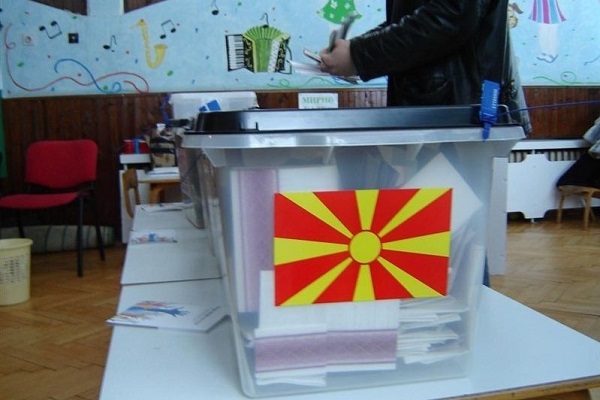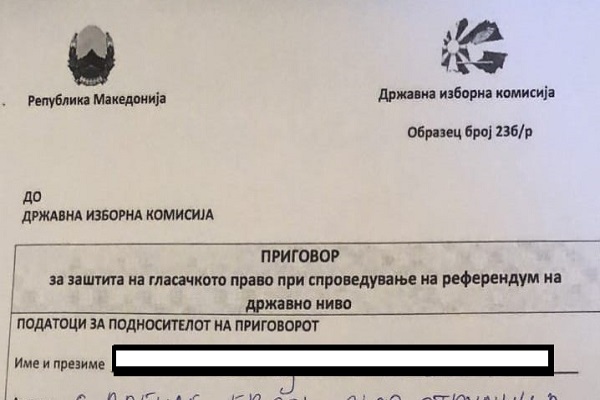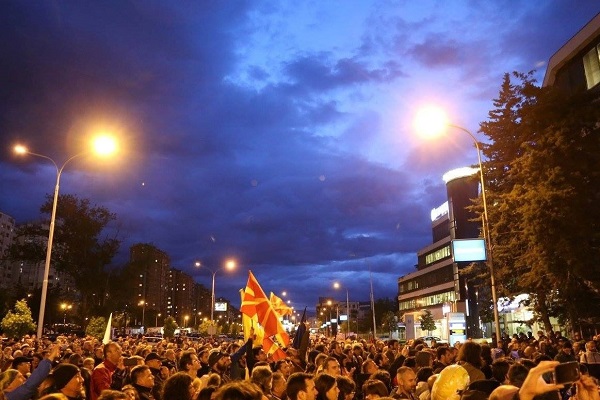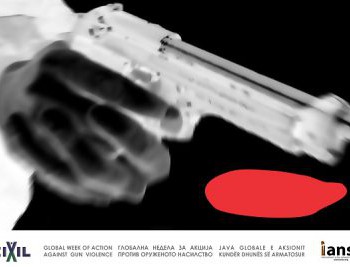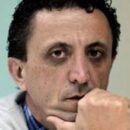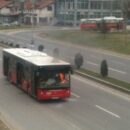In the line of irregularities on the day of the voting on the referendum question “for” or “against” accepting the Agreement between Macedonia and Greece, the electoral administration is first on CIVIL’s list as a cause of irregularities.
The Electoral Boards, obviously insufficiently educated, having in consideration the training they rejected from the Municipal Elections Commissions, and trained by the State Election Commission, did not manage very well in solving the problems with the Voters Register, the electoral material, with the rules and procedures in their work, including respect for the Code of Conduct.
According to the reports of CIVIL’s observers from almost every polling station they visited, the greatest challenge for the Electoral Boards is how to respond when citizens do not figure on the Voters Register, to the reactions of citizens when they notice that on the list there are deceased persons, when voters have new ID cards issued after the closing of the Voters Register, or when they see that the voter has an expired ID card. The first reaction is calling the MEC, the second reaction is referring them to the MEC, and the most common one is calling the SEC “headquarters” because they do not know what to do with the voters. In one case noted by CIVIL’s observers, the discontented voter was sent to the police, for him to be later sent to the MEC.
For example, in polling station 1676, Sveti Nikole, five persons that have been deceased for several years still figure on the Voters Register, whereas two (alive) voters with valid documents for personal identification do not figure. These persons did not exercise their voters’ rights.
In polling station 2843, Center, from two voters of a same family, mother and son with the same address, one figures on the Voters Register, while the other one does not.
In Bitola, polling station 0109, a voter with an ID card issued in August does not figure in the Voters Register. The Electoral Board refers him to the MEC, but because they do not succeed in finding him in the Voters Register, the voter does not exercise his right to vote.
The Electoral Board in polling station 1065, Kumanovo, confronted a voter who after the electronic check of the Voters Register did figure, but on the day of the voting did not figure on the Voters Register. By some logic, the Electoral Board sent the voter to the police. The police sent him to the MEC, and from there he was sent home – without the right to vote.
“One voter is not on the Voters Register”, “Two voters are not on the Voters Register”, “Voters cannot find themselves on the Voters Register”, were the reports of the observers after every other call, sending of message or email to CIVIL’s press center on the referendum day of September 30th…
The Electoral Boards also had problems with the electoral material. They had the biggest problem with the UV lamps. The reports that came in from CIVIL’s observers pointed out that in most cases the UV lamps did not work. In this case, they were either replaced with other ones or they waited for new ones to be brought from the MEC, thus interrupting the voting. In one case, in polling station 2281, Stip, the Electoral Board had not performed a check with the UV lamp on the first voter who had come to vote. In another case, in polling station 2634, Karpos, the Electoral Board had not allowed three voters to vote because the UV lamp had not been working. In this situation, one of the voters argued, after which a quarrel broke out between him and a member of the Electoral Board.
In polling station 2739, Kisela Voda, the UV was not working, but the voting was not interrupted while they were waiting for a lamp from the MEC to arrive.
Elections after elections, observers report on violations of the secrecy of vote and many other transgressions by members of the Electoral Boards. Some of them had been reading the names of voters out loud. Furthermore, some members of the Electoral Boards had been commenting out loud and agitating, constantly calling on the phone, obviously, without an official need, and behaving cruelly towards the observers, but also towards the voters.
In polling station 1060, Kumanovo, members of the Electoral Board had been loudly reading the names of the voters, some even several times. At the same time, they had behaved indecently also to some of the observers and discredited their remarks. In polling station 2762, Kisela Voda, a member of the Electoral Board read the name of one of the voters out loud. When the citizen opposed, one of the observers called CIVIL to ask if this was allowed. After they received a reply from the SEC that it is not allowed, the member of the Electoral Board did not stop behaving extremely rude until the end of the voting on September 30.
These are short illustrations of the low respect for the procedures and the right to vote, despite the efforts the SEC made to prepare educational material, including a 30-minute video. Obviously, some of the members of the Electoral Boards, otherwise employed in the administration, do not understand that they are there to serve as an example for legality and strict adherence to the procedures, that they receive a considerable daily allowance for their work that come precisely out of the citizens’ pockets. This is indeed a serious remark to the SEC, an institution that has to ensure for its bodies to function correctly and according to the law, but here there is also work for the Minister of Information Society and Administration, Damjan Mancevski.
And this is not all. Several reports from CIVIL’s observers on the day of the voting testify to a large number of errors that members of the Electoral Boards make in the procedures. They forget to mark the voter with spray or to check him with an UV lamp. In several reports from the ground, the poor set-up of the polling booth is mentioned, the lack of polling booths for people with disabilities, the continuous photographing (selfies) of members of the Electoral Boards inside the polling stations, and in many cases members of the Electoral Boards did not respect the obligation to wear badges for identification. Certainly, this did not prevent them from eagerly identifying CIVIL’s observers, demanding them unnecessary authorizations and documents, asking them about personal data of the responsible persons in the organization or asking them how much they are paid for their observation.
The electoral administration failed, obviously also on the day of the voting for disabled and sick persons and prisoners who voted on Saturday, September 29.
More specifically, ten prisoners in the Tetovo prison did not succeed to realize their right to vote because they were not found on the additional Voters Register, because they had been arrested, that is, sent to jail, after the deadline for registering. The Electoral Board did not allow them to vote, MEC Tetovo responded that if they had not registered until the deadline to be on the additional Voters Register – they do not have the right to vote. The branch office of the SEC remained in its position that they do not have the competence to make a decision with the explanation that decisions can be made only by members of the SEC, and that they can only implement the decisions made. The SEC replied that the prisoners figure on their place of residence, hence the only possibility for them to exercise their right to vote is if the Prison Administration decides to release them. And the Tetovo prison is not the only case.
“If just one CIVIL observer managed to register more than 100 voters whose right had been denied, in just one municipality, one can only imagine the proportions of this problem. However, there is no institutional response, nor will to determine the number of people who have returned from the polling stations, without voting”, is said in CIVIL’s announcement on the violation of the right to vote.
In short, the electoral administration under the leadership also of the current, temporary composition, failed at the expense of the citizens. Probably, the circumstances in which these shortcomings have been made are far more complex and demand full attention of several departments in the government.
CIVIL’s warnings and recommendations in almost every election cycle in terms that a final solution has to be found regarding the chaos of the Voters Register, have to be finally understood and implemented. Greater attention must be paid in the education of the electoral administration, and above all, the right to vote must be protected and mechanisms for realizing the right to vote must be found without transferring the responsibilities from one institution to another, while no one fulfills the main task – maximum respect for the right to vote. There has to be responsibility!
Biljana Jordanovska
This post is also available in: Macedonian
 Македонски
Македонски Shqip
Shqip English
English
